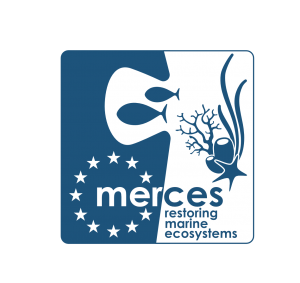
Marine Ecosystem Restoration in Changing European Seas
EcoReach is currently Co-Leader of the WP9 (Dissemination, communication and public engagement) of the MERCES project, funded by the European Union’s Horizon 2020 research and innovation program.
MERCES project overview and objectives
The Marine Ecosystem Restoration in Changing European Seas (MERCES) EU project is focused on the restoration of different degraded marine habitats, with the aim of: 1) assessing the potential of different technologies and approaches; 2) quantifying the returns in terms of ecosystems services and their socio-economic impacts; 3) defining the legal-policy and governance frameworks needed to optimize the effectiveness of the different restoration approaches. Specific aims include: a) improving existing, and developing new restoration actions of degraded marine habitats; b) increasing the adaptation of EU degraded marine habitats to global change; c) enhancing marine ecosystem resilience and services; d) conducting cost-benefit analyses for marine restoration measures; e) creating new industrial targets and opportunities. To achieve these objectives MERCES created a multi-disciplinary consortium (28 European partners) with skills in marine ecology, restoration, law, policy and governance, socio-economics, knowledge transfer, dissemination and communication. MERCES will start from the inventory of EU degraded marine habitats (WP1), conduct pilot restoration experiments (WP2, WP3, WP4), assess the effects of restoration on ecosystem services (WP5). The legal, policy and governance outputs will make effective the potential of marine restoration (WP6) and one dedicated WP will assess the socioeconomic returns of marine ecosystems’ restoration (WP7). The transfer of knowledge and the links with the industrial stakeholders will be the focus of WP8. The results of MERCES will be disseminated to the widest audience (WP9). The project will be managed through a dedicated management office (WP10). MERCES will contribute to the Blue Growth by: i) improving the EU scientific knowledge on marine restoration, ii) contributing to EU Marine Directives; iii) implementing the Restoration Agenda, iv) enhancing the industrial capacity in this field, v) increasing the competitiveness of EU in the world market of restoration, and vi) offering new employment opportunities.
Project partners
MERCES brings together a large, multi-disciplinary Consortium with skills in marine ecology, spatial modelling, marine ecosystem restoration, law, policy and governance, socio-economics, knowledge transfer, dissemination and communication, from the multifaceted worlds of business (6 SMEs from 4 EU countries), academia (11 partners from 10 EU countries), research (8 partners of which 7 from EU countries and 1 from Norway) and environmental associations (3 partners of which 2 from EU countries and 1 from Turkey).
Advisory Board
The MERCES Advisory Board, composed of renowned external experts in fields related with the topics and expected results of MERCES, will act as a scientific auditing panel aimed at ensuring the best scientific direction and output of all desk and field activities of the project.
Advisory board members:
James Aronson – Board of Directors (Representative-at-large) of the Society for Ecological Restoration, Centre d’Ecologie Fonctionnelle et Evolutive, France
Roberto Cimino – R&D planning and Technology Scenarios, VP Eni, Italy
Paul Snelgrove – Department of Ocean Sciences and Biology Department Memorial University of Newfoundland St. John’s NL A1C 5S7, Canada
Cindy Van Dover – Director of the Duke Marine Lab, Duke University, North Carolina, USA
Project details
Project number: Grant agreement no. 689518
Duration: 48 months
Project leader: Polytechnic University of Marche (Roberto Danovaro)
Project webpage: www.merces-project.eu
Main funder: European Union’s Horizon 2020 research and innovation program.
FOLLOW MERCES ON Facebook, Twitter and YouTube.
